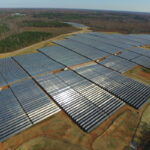I have consistently supported the expansion of solar energy in Virginia, at least up to a point where it doesn’t compromise the reliability of the electric grid. When up-front capital costs and fuel costs are taken into account, solar is the lowest cost source of electricity in Virginia. Furthermore, as a supporter of property rights, I believe that rural landowners should be free to contract with developers to build solar farms on parcels that might otherwise lie fallow or go underutilized. Building solar farms potentially could put hundreds of millions of dollars in the pockets of rural landowners.
But I understand why people in rural Virginia get up in arms when big solar developers want to blanket thousands of acres with solar panels. I don’t necessarily agree with their proposed remedies, but I do understand.
Virginia’s urban/rural divide is becoming more pronounced than ever. That divide is most visible in voting results and electoral maps that show a vast geographic expanse of “red” Virginia compared to concentrated, highly populated clusters in “blue” Virginia. Views differ on a wide range of issues from gun rights and abortion to taxes and climate change.
It is doctrine among Virginia’s cultural elites that climate change represents an existential threat to humanity and that the commonwealth should spare no expense to decarbonize its economy as rapidly as possible. Literally, the fate of the world is at stake. Trouble is, most “red county” residents don’t believe it. Furthermore, the cost of combating climate change, as it turns out, falls disproportionately upon “red county” Virginia.
Higher electricity prices impact every economic sector, but second only to fossil fuels, they hit manufacturing hardest — and light manufacturing is the economic underpinning of Virginia’s rural economy. University professors won’t lose their jobs if electric rates double. Government employees won’t be let go. Nonprofit organizations won’t suffer. Northern Virginia techies employed by government contractors won’t feel the sting. But rural communities very well could lose jobs . And people can’t made them up, as John Kerry suggests, by becoming solar- or wind-power technicians.
What’s more, the cultural elites don’t just want to decarbonize the electric grid. They want to decarbonize the transportation economy by driving up the cost of gasoline in a bid to phase out internal combustion cars. That’s tough on rural residents who are 100% dependent upon their automobiles to get to work — walking, biking and mass transit are not options in the boonies — and gasoline takes a bigger chomp out of their pocketbooks.
Here’s what makes decarbonization policies even harder to swallow: Urban Virginians want to build all those millions of solar panels in rural areas — not in urban areas where the greatest demand is. If urban Virginians are so hepped up on solar panels, why don’t they build them on their own rooftops, parking lots, and vacant property? They want the green power, but they want someone else to make the sacrifice.
“These things will not be built … in Reston,” observed House Minority Leader Todd Gilbert, R-Shenandoah, at a Jan. 27 hearing reported by The Virginia Mercury. “It’s going to completely transform the character of places that we know and love. And I’m not sure that we have fully thought through the ramifications of these policies.”
I’m not sure what rural “character” Gilbert is referring to. The number of farms in Virginia is shrinking, and so is the land devoted to agriculture. The solar farms won’t displace anyone. To the contrary, taxes and lease payments to landowners can help prop up rural economies. Solar farms will even support a few jobs. Local boards can easily enact ordinances to deal with any minor nuisances that arise.
I’m convinced that much of the opposition to solar farms comes from the desire to flash a giant middle finger to environmentalists and cultural elites. “You want our land for your stinkin’ solar panels, well F— you!”
Like I said, I get it. But that’s not a rational response. The solar revolution represents a rare opportunity for rural economic revival. It’s far better to have cost-competitive solar farms than wildly inexpensive offshore wind farms or “energy efficiency” programs of dubious economic value, none of which would benefit red-county Virginia. Rather than hinder their development, Republican legislators should be working overtime to figure out how to milk solar farms for all the economic value for their constituents that they can.



